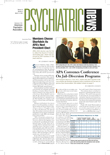During the past few years, there has been increasing reason to believe that some persons with schizophrenia can recover—that is, cross the bridge from the world of voices, delusions, and bizarre behavior into one that is, if not ideal, at least less traumatic and more conventional.
Take the case of scientist John Nash depicted in the book A Beautiful Mind and a movie by that same title. Or Frederick Frese, Ph.D., who had schizophrenia and who today is a psychologist and vice president of the National Alliance for the Mentally Ill (Psychiatric News, August 1, 2003). Or two follow-up studies—one published in 1988 and the other in 2001—that found that about half of schizophrenia patients eventually recover or have only mild impairments.
But what is the more immediate prognosis for young persons who have experienced a first episode of schizophrenia? Good for some but unfortunately not for most, a new study suggests. It was headed by Delbert Robinson, M.D., a research psychiatrist at Zucker Hillside Hospital in Glen Oaks, N.Y., and was published in the March American Journal of Psychiatry.
Although two investigations have been undertaken into the long-term prognosis for schizophrenia patients, as mentioned above, Robinson’s appears to be the first to assess recovery in young persons with schizophrenia.
They recruited 118 young people whose average age was 25 and who had developed schizophrenia or schizoaffective disorder. They treated the subjects over the next five years and then assessed them, at baseline and periodically during the five-year period, for the presence of illness symptoms and to determine how well they were functioning socially and vocationally.
For instance, the researchers determined whether subjects were neat, clean, and appropriately dressed; performing day-to-day tasks without supervision; holding a paying job, attending school at least part time, or performing a homemaker role adequately; and interacting with a friend or romantic contact at least once a week.
At the end of the five years, the researchers found, half of the subjects had achieved remission of positive and negative symptoms for at least two years; a quarter of their subjects had achieved sustained, adequate vocational and social functioning; and about one-eighth met full recovery criteria for two years or more. While many subjects had stopped medication at some point during the study, long-term medication adherence was very high.
So, “although some patients with first-episode schizophrenia can achieve sustained symptomatic and functional recovery,” the scientists concluded, “the overall rate of recovery during the early years of the illness is low.”
Though only a minority of subjects in this study achieved full recovery, two other scientists studying schizophrenia recovery—Alex Kopelwicz, M.D., and Robert Liberman, M.D., of the University of California at Los Angeles—said in an e-mail to Psychiatric News, “This study’s findings should put to rest the nihilistic but too-often-held view that schizophrenia necessarily runs a chronic, deteriorative course. Most important, by using clearly articulated, operational definitions of recovery, this study should open the way for future research aimed at developing treatments that promote recovery from schizophrenia.”
In fact, Robinson and his colleagues scrutinized their data to see if they could identify some of the factors that give young persons with schizophrenia a “leg up” toward recovery. They found, for example, that young people with a schizoaffective disorder appear to have a particularly good prospect of symptom remission. Young people who have either schizophrenia or schizoaffective disorder and fairly good cognitive functioning at stabilization have a good chance of making a full recovery. And a shorter duration of psychosis before treatment appears to predict both symptom remission and full recovery.
The study was funded by the National Institutes of Health.
Am J Psychiatry 2004 161 473
